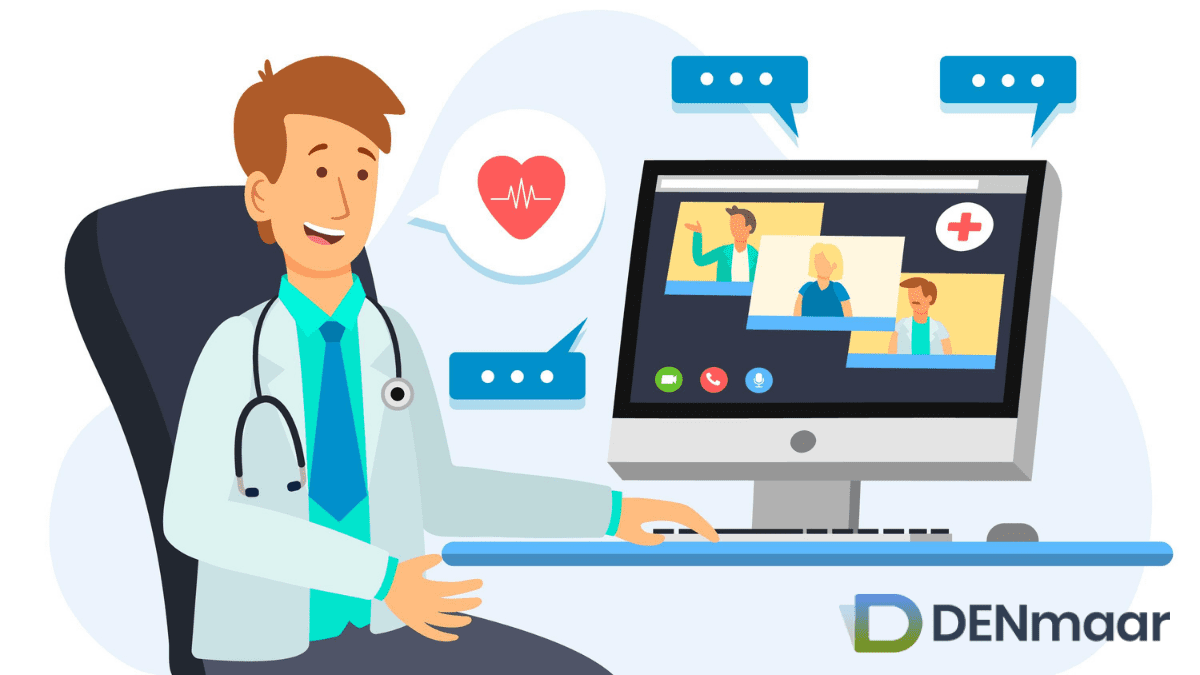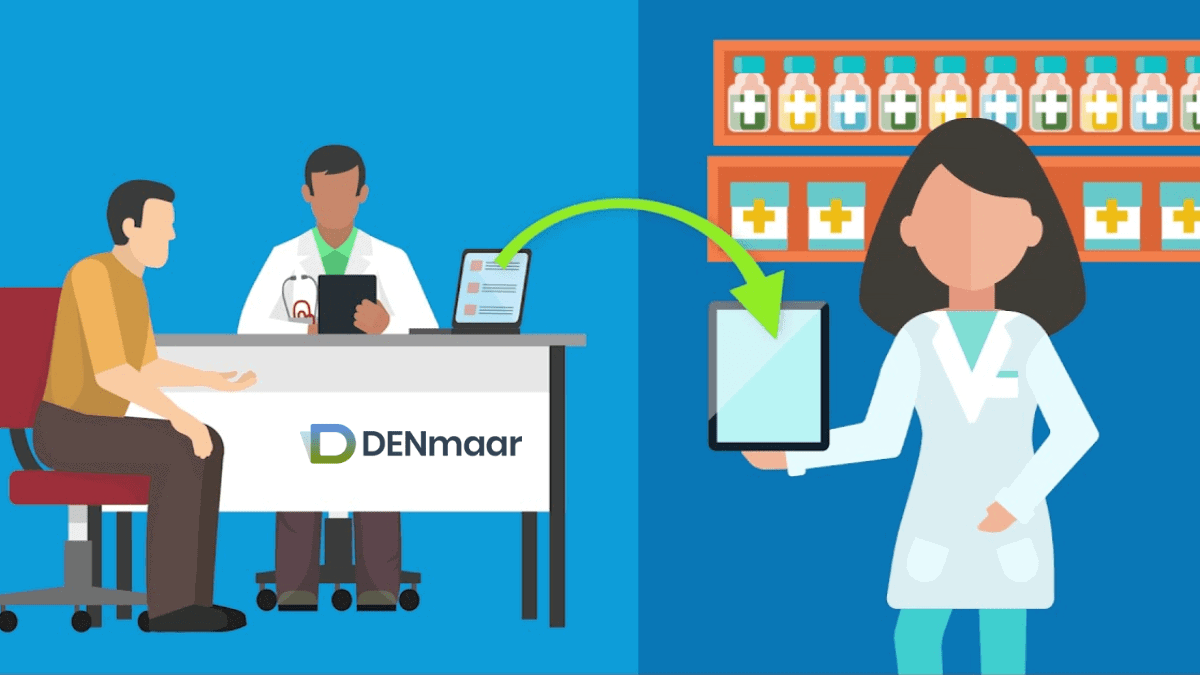Our EHR/RCM solution tailored for psychiatric and counseling services offers comprehensive support for practitioners in managing patient records and revenue cycles efficiently. Seamlessly integrated with specialized features, our platform caters to the unique needs of mental health professionals, ensuring streamlined operations and enhanced patient care delivery.
Behavioral Healthcare Technology
DENmaar Guardian EHR/RCM Revolution

Time Tracking

Claim Support

More Revenue
EHR/RCM
For Psychiatric and Counseling Services


Improves patient care
outcomes by providing better decisions, care coordination, and patient engagement

Reduces medication errors
by checking for interactions and automating refills

Enhances patient-provider communication
by supporting telepsychiatry and secure messaging

Simplifies medication management
with proper data accessibility
Streamlines clinical workflows
by offering intuitive dashboards, note templates, digital scheduling, and billing features
Increases revenue and reduces costs
by optimizing coding, claims, and collections processes
Ensures compliance and security
by following HIPAA, HITECH, and other regulations
The DENmaar service teams supports insurance credentialing and
the insurance claims process, ensuring maximum cash flow and revenue.
Professional
Insurance Services
Insurance Credentialing
Services
DENmaars insurance services are for group practices, where adding providers’ to insurance panels and maximum insurance revenue is a priority.
- Provider Enrollment and Credentialing services
- CAQH Registration and Enrollment
- Individual and Group Medicare Enrollment
- Insurance Contract Negotiations
- Payer Fee Schedule Creation and Evaluation
- Telemedicine Credentialing
Behavioral
Health Billing
We offer top-tier behavioral health billing services powered by our robust software and expert consultants.
- Professional Billing
- 24 Hour Claims Submission
- Claim Status provided in Real-Time
- Immediate Eligibility Verification
- Rejection and Denial Resolution
- U.S based Claims Specialist Assigned
- Credentialing Specialist Assigned to Account
What Our Clients Say
Thank you for your diligence!! I appreciate it so much. Thank you Edwina…

Thank you so much Amy! I will be referring to DENmaar as often as I am asked about credentialing services.

Thank you so so much Donna. You have helped make our company so much stronger. We appreciate you.

Working with the Denmaar platform and Amy has been a pleasure, thank you! It is a relief not to worry about the insurance portion of the private work.

Edwina, Thanks for your help. I appreciate your patience with me.

Victoria you have made my life so much easier. Thank you for the outstanding work. You are so helpful.

Thank you Donna for jumping in and helping us out so much. You have no idea how much I appreciate it!







“I absolutely love all the features for intake/evaluation/assessment/progress notes!”
Thanks so much for all your help over the years, we COULD NOT have built our behavioral health division without your keen expertise and steadfast work ethic!
Thanks so much for your help in getting me set up with DENmaar. I am looking forward to working with your company as you all seem so much more personal than other places I have checked out. Hope you all never lose that. Wishing you blessings in your life!
Working with the DENmaar team showed great professionalism beyond anything I would ever expect! Prompt on returning emails. Whenever I had a question, it was almost returned within the hour. Living overseas I would send emails not expecting a response until the next workday but there were times that in the middle of the night, I would get back fully answered emails to any questions I had. My wife and I are confident that if the rest of DENmaar is half as good as the onboarding is this will be a great experience for us. Thank you for everything.
Thank you, I appreciate all that the team does.
love working with Denmaar. You guys are always on it. You Do not find that at most places. Thanks again,
Wonderful and thank you so much. I do not know what I would do without you and your team.
Thank you so much for your time and your amazing help! It is appreciated! Thank you
I really appreciate you getting back to me so quickly and explaining so simply what is going on. Makes complete sense! Thank you again for working so hard! You are awesome.
Thank you for helping me through my problems with getting the right documents to you. I am so glad we went with your company as everyone has been so nice to work with.
Hey Victoria, Thanks for all your help thus far. You have been very helpful, fast, and so thorough! you get an A+ from me
“Victoria, you have been amazing throughout this entire process. You are always pleasant, and you always reply so quickly. I appreciate you so much!”
“Thanks so much for helping along this process and following up with me. I truly appreciate it.”
“Yea!!!! You are awesome. Thank you so much.”
“Thank you for your help! I greatly appreciate it.”
I appreciate your hard work!”
“You are wonderful, thank you so much for all your patience and help with this!
“Thank you for the extra support. It has made me much more comfortable and taken away considerable stress.”
Victoria
“I can’t thank you enough. You really are the best. I don’t know what I would do without DENmaar “
“Thank you so much! Erika, I appreciate you so much. I will cease to be concerned.”
“Great working and getting to know Donna! She’s a power house and knows her stuff.”
Victoria
I really appreciate all the legwork that you are doing for me in getting me on these panels. It’s really greatly appreciated and I want to thank you for all your efforts on my behalf. Warmest Regards,
“Donna, Erika and Nicole are always so kind and helpful”
“Donna helped me tremendously when I started!”
“Working with Victoria and Erika has been great. So happy with your services.”
“Thank you Lindsay for your patience.”
Melissa Wutrick
“I appreciate the good work and helpfulness.”
“Thank you so much.
I seriously dont know what i would do without you guys!!”
“Thank you Edwina for helping me with this situation.”
“So grateful for all of your help Chandra, Sorry this was such a complicated one.”
“Thanks DENmaar, you have been amazing. And thank you for being so understanding. I will definitely be referring people over to you for billing.“
“Chris and his world class DENmaar team have done the billing and credentialing for my practice for 10+ years. There are not enough of superlative adjectives to describe how pleased I am with the services they have provided. The persistent and tenacious approach to billing has yielded the most lucrative cash inflow that I have ever experienced in my 30+ years of private practice. Chris and his group help with keeping up credentialing in superb fashion. I have referred many fellow professionals to use DENmaar and all are equally awed. I would recommend them with the highest possible accolades.”
“Amy is awesome! “
“Nicole you’re the best!”
“Thank you Amy. I truly appreciate all you do!”
“Huge shout out to Victoria and Ashely for putting up with me and helping our practice continue to grow. Fourteen short months ago we founded BN Wellness Group, and we now are getting recognition as a force in the greater Cleveland area. “
“DENmaar you are a wealth of knowledge and I greatly appreciate your time and help. “
Thank you!
Donna your capabilities to get us paneled are wonderful.
You have been just fantastic….
Thank you so much DENmaar! Thank you for ALL that you do to make our company run smoothly; we appreciate YOU.
You are a real pleasure to work with Victoria. I know I’ve asked you to do a lot of hand holding as a new group practice owner.
And you should know that I recognize the extra effort and really appreciate the way you’ve supported me through this process. Thank you again for the professional service and courtesies you’ve extended. Definitely worth the expense.
Thank you Donna for your GREAT assistance!!! You are awesome to work with.
whohooooool Amy is great give her chocolate cakel
Thank you!
Thank you so much Donna. It is really helpful, and exactly what we were looking for.
Thank You for your fast response.
Thank you so much Donna for help over this past week, you have been awesome!! We all really appreciate it.
Donna. You are so awesome and we appreciate your hard work.
I just wanted to thank you Donna for diligently following up with
BCBS and keeping me in the loop!
Edwina is a true hero in my book. She was incredibly persistent, professional & patient thru the whole grueling process with Optum. Could not have done it without her. I am SO grateful for her awesome efforts. Thank for all you and the team does for us.
YOU are a SAINT Edwina!
Thank you!!!
Hello Chris,
The credentialing process with GA Medicaid took long but all through the process Denmaar employees were always responsive and ready to help. I was assigned to Nicole first and Amy later. They both were patient and kept following up with Medicaid and updating me till I finally got approved. I’m happy with my experience
Victoria you are awesome! TY!!!
I can’t express my gratitude for you Donna,

Capterra, Software Advice And Get App 2023 Best Of Badges Awarded To DENmaar
2023 “Best of” badge winners = DENmaar Guardian has earned a well-deserved Best Value Badge.
See our reviews for our software being recognized as an impactful solution for your business.




Our Latest Blogs

How to Handle Claim Denials and Maximize your Reimbursements
It is hard to imagine what the healthcare scene would be like without medical insurance. Medical insurance is, after all, responsible for making health care services accessible to people from all walks of life. That being said, the process that entails claiming insurance and reimbursements can be incredibly frustrating and tedious to undertake with frequent claim denials being a major issue that healthcare organizations and providers face today.
A claim is said to be denied when a health insurance company refuses to pay the submitted claim. Frequent claims denials can affect the financial health of your healthcare organization. We’ve seen practices dissolve because of decreased revenue triggered by high rates of rejected claims.
So it is imperative for a healthcare provider or practice to know how to handle claims. This is precisely what we will be focusing on in this article.
So without much further ado, let’s understand what cause claim denials and how you can avoid or manage them to maximize your reimbursements.
Common Reasons for Claim Denials
The following are some of the most common reasons for claim denials:
- • Missing or incorrect information
- • Issues with provider network
- • Redundant claim
- • Inaccurate coding of service
- • Non covered services
- • No eligibility verification
- • Delay in filing claims
- • Insufficient medical necessity.
Preventive Measures you Can Take to Reduce Claim Denials
Like we said before, claim denials can diminish a practice’s revenue. Therefore, it is very important to develop a strategic process to identify what may have caused the situation and address it in time to maximize reimbursements.
As such, we believe the following preventive measures can help your practice accomplish that without a hassle.
1. Set up a denial management team
Having a dedicated team that is focused on identifying and resolving claim denials is a great way of handling this problem in an efficient manner. The team can be assigned the role of immediately identifying the cause of a denial, finding a solution to the issue and submitting an appeal on time to make sure the practice isn’t missing out on valuable reimbursements.
Their purpose would be to investigate each cause of a claim denial systematically in a bid to ferret out the root cause. They can then build a process that makes managing claim denials simple in the future.
2. Identify and Sort the Cause of Denial
We highly recommend identifying the root cause of a claim denial and then sorting them into groups. There could be a variety of reasons for a claim being denied. It could be missing information, incorrect billing details, or simple eligibility issues. Whatever the reason, your practice needs to document them and your staff must be appropriately trained to avoid these mistakes in the future.
3. Fast Action
It is recommended to not waste time when you get a notice of claim denial. Instead, you should immediately start working on an appeal that you will submit to make the insurance company reverse their decision. The process of re-submission is a complicated one, and as such, should be undertaken as quickly as possible.
Not submitting an appeal on time will result in your application being rejected for good while your practice suffers massive revenue losses.
4. Monitor Your Denial Management Process
Keeping a record of the denials you’ve received, when you’ve received them and the measures you took to address them, will ultimately help you monitor your effectiveness in dealing with such situations. You’ll know if your team is capable of handling denials, what area they are lacking in and if training would help decrease further errors.
We recommend using visual charts to determine the impact of claim denials on your revenue. You should also work hard to device and implement strategies at every fundamental step of your organization’s revenue cycle.
5. Outsourcing
Finally, if you find the whole process of handling claim denials overwhelming, you can always reach out to DENmaar to handle it for you. DENmaar specializes in end-to-end insurance credentialing, thus helping providers and healthcare organizations get on an insurance company’s panel. We take care of flawless documentation to make sure your submitted claims are clean, compliant, and have little to no chance of being denied.
If the claims are denied, we will immediately submit an appeal to make sure your organization isn’t losing out on hard-earned revenue. Outsourcing to DENmaar will also alleviate the burden of credentialing off of your staff, thus freeing them up so they can focus on providing better care to your patients.
The Bottom Line
All of the preventive measures we discussed above can help your practice avoid the time-consuming and costly denial management process. In fact, you will be able to handle claims more efficiently if you just identify the core reason behind the denial of claims plaguing your practice and use appropriate preventive measures to tackle them once and for all.
These preventive measures can be:
- • Including correct patient information and medical records in your application
- • Filing claims in a timely manner
- • Staying updated on changes in the insurance claim process
- • Training your staff in medical billing and coding
- • Employing a good EMR (electronic medical recording) system to get access to patient information.
- • Verify a patient’s eligibility and insurance before rendering service
- • Monitor your revenue generation cycle regularly.
Need help with claim denials? Contact us at DENmaar now for expert advice and assistance.

How to Expand Private Practice Using Telemedicine in 2022
Let’s face it, access to healthcare for millions would have been practically impossible if it wasn’t for telemedicine technology. In many ways, people around the world were blessed with the technological benefits of telemedicine, which allowed doctors to consult and care for their patients while adhering to the strict covid-19 protocols that briefly became the new normal in 2020.
Telemedicine presents a convenient way for patients to reach out to healthcare providers through the internet or via a basic phone call. At the height of the pandemic, the use of telehealth was believed to have increased by 78%. This has made many healthcare organizations optimistic about telemedicine’s role in the future of the healthcare industry.
In fact, experts now estimate that almost $250 billion could be spent on virtual care. Private Practices can learn a lot from this growing trend and benefit immensely by adopting the technology as soon as possible.
The Many Benefits of Telemedicine.
There are countless benefits to adopting telemedicine technology. Some of the most prominent benefits are listed below:
- • Convenient for both patients and doctors
- • Access to healthcare for rural areas
- • Probably lowered premiums as virtual care makes the primary care provider the first point of contact.
- • Improved patient outcomes with remote monitoring
- • Improved access to behavioral healthcare, especially in regions lacking mental health care provisions.
- • Transit between home and clinic completely eliminated, thus saving time.
- • No long wait times
How Private Practices can Adopt Telemedicine
Private practices must first determine what services they wish to offer via telemedicine, after which, they should ensure that the service is provided in a simple, convenient, and secure manner.
1. Securing HIPAA Compliance
HIPAA Compliance can be an ideal starting point for private practices that want to implement telemedicine. This means that typical video conferencing solutions like Zoom and Skype won’t be suitable options as they do not adhere to HIPAA guidelines. Instead, you will have to work with third-party service providers that will develop a secure video conferencing platform specifically for your practice.
It is imperative to keep patient information safe and secure, which is not possible with free conferencing platforms like Zoom. So security should be your topmost priority when developing a telemedicine solution.
2. Outsource
Private practices won’t have the staff or resources needed to develop a telemedicine solution in-house. As such, it would be wise to find and partner up with a third party like DENmaar to design a telemedicine platform that caters to the needs of your practice.
3. Testing is Fundamental
Once you have the software to conduct virtual visits, do not jump the shark and start providing virtual care right away. Instead, test the solution thoroughly, preferably by experimenting with your staff to make sure the app is functioning appropriately. These tests will help you identify bugs and defects before the platform has been deployed and give you a chance to fix them. You can seek out the help of your app development partner to polish the platform before it is finally deployed.
Employing DENmaar’s Telemedicine Technology
If you run a Private Practice and wish to reap the perks of telemedicine, then look no further than the TeleHealth solution provided by DENmaar to satiate your requirements. Our TeleHealth solution offers a fast and secure method of initiating a teletherapy session with the simplicity of making a phone call.
Our TeleHealth System is HIPAA compliant, offering a secure means of providing therapy or medical e-prescription writing services to patients with ease and security. You can learn more about our TeleHealth system by contacting us today.
Error: Contact form not found.

Why Is E-Prescribing Essential For Providers & Patients
The introduction of e-prescription in 2003 made it a more convenient, cheaper, and safer alternative to prescription for doctors, pharmacies, and patients.
Through electronic prescribing, or ‘e-prescribing,’ healthcare providers can enter prescription information into a computer – such as a tablet, laptop, or desktop computer – and use special software to transmit prescriptions to pharmacies and connect to transport networks securely.
The adoption of standards to facilitate the electronic prescribing process is a crucial government component in accelerating the adoption of electronic health records and building national health information technology infrastructure.
In short, the goal of increasing e-Prescribing is to improve workflow, increase patient safety, and increase transparency in future drug pricing.
What is e-prescribing?
Electronic prescribing is a process that healthcare providers use to send prescriptions to a patient’s preferred pharmacy.
There are several benefits to e-prescription software (Rcopia), including simplifying obtaining a pharmacy prescription, dispensing medication, and getting a new refill.
Medical software plays a vital role in the adoption and use of electronic prescriptions, as these solutions contain the necessary tools.
Imagine the challenge for a pediatrician looking at a new patient and deciding what medications they can take, exceptionally if the patient’s parents did not prescribe them ahead of time. In such cases, determining what medications the young patient is taking or what may be allergic to them becomes more complex and dangerous.
Electronic prescriptions are just one condition that describes the immediate benefits of electronic medical records (EMR) software. However, these tools are essential features of the best medical software, offering healthcare providers a detailed look at a patient’s medication history, even if they’ve never seen one before.
In 2019, doctors used e-prescription for controlled and non-controlled substances online at a higher rate than in the previous two years. In addition, online prescriptions for uncontrolled substances increased from 76 percent in 2017 to 86 percent in 2019.
While the COVID-19 epidemic affects patients and providers worldwide, a reliable national health information network has never been more critical.
EPCS Technology
Many states enacted electronic prescription requirements, meaning that more prescriptions were written electronically, which helped protect patients’ prescriptions from fraud and abuse. Since 2017, the number of electronic prescriptions written has increased.
Furthermore, the introduction and use of Electronic Prescription for Controlled Substances (EPCS) technology aim to help providers integrate prescription information into EHR (electronic health records), which can increase patient safety and help prevent diversion and fraud. ECPS technology can also facilitate doctors’ workflow and reduce the burden on the patient.
Electronic prescription software options
Some popular software choices for 2022 offer e-prescribing for healthcare organizations without an EMR system.
Other high-performance companies offer electronically prescribed programs that act as standalone applications or integrate with existing EHR platforms. These tools usually make finding prescription drugs easier, checking patient drug records, and obtaining real-time prescriptions. Most potential adverse reactions and drug tests against known patient allergies are also indicated.
Best E-Prescription Software
With DENmaar, you would be able to access all the medication information regarding your patient at a button. The medications prescribed in Rcopia (e-prescription software) are pulled into our EHR, and we provide a very intuitive and easy-to-use access to the medication information. The data is extracted in real-time from the Rcopia portal and made available to provide a seamless experience.
Why is e-prescription essential?
Prevent clerical errors
According to a Food and Drug Administration study, there have been 95,000 prescription errors since 2000. One of the major causes of this problem is that many drugs are similar or have similar spellings. Electronic prescriptions help to illustrate this by showing drug options side by side and allowing providers to customize the prescription of their choice.
Complete the patient’s medical records
The second most important advantage of e-prescription is its data management capabilities. By keeping medical records, other healthcare providers can determine what prescription medications the patient is taking and when their prescription was last filled. In addition, electronic prescriptions can redefine compliance by making it easier for states to track prescriptions in multiple pharmacies and allowing states to integrate them into prescription drug monitoring programs (PDMPs).
Healthcare provider recommendation tools
Electronic prescribing provides instant information on allergies, drug interactions, and duplicate treatments, providing health professionals with the data and professional intelligence needed to ensure patients receive the proper medication. Electronic prescriptions also include system alerts that notify healthcare professionals about potential drug interactions and repeat treatments.
A significant additional benefit of e-prescription is time-saving for pharmacy staff who calls to check orders. Moreover, carefully written prescriptions save time for pharmacy staff and doctors.
E-prescription capabilities allow physicians and healthcare professionals to meet all the challenges and make it easier to determine which medications the new patient is taking – even if they do not remember them before the visit.
Our Partners





Please contact us with any questions
Let’s Talk: 844-727-3627
Get Started
- Tailored EHR/RCM solution for psychiatric and counseling services
- Comprehensive support for managing patient records and revenue cycles
- Specialized features seamlessly integrated
- Addresses unique needs of mental health professionals
- Streamlines operations and enhances patient care delivery



